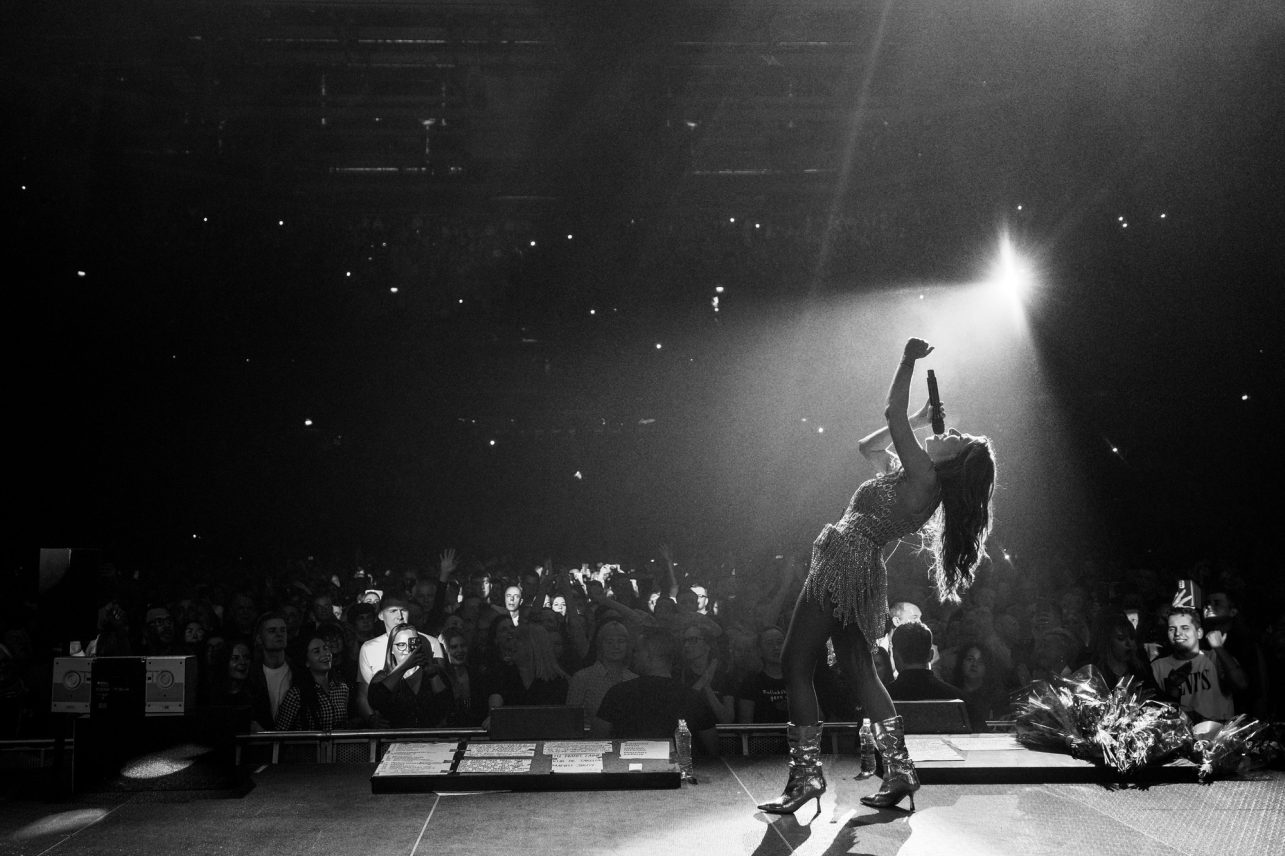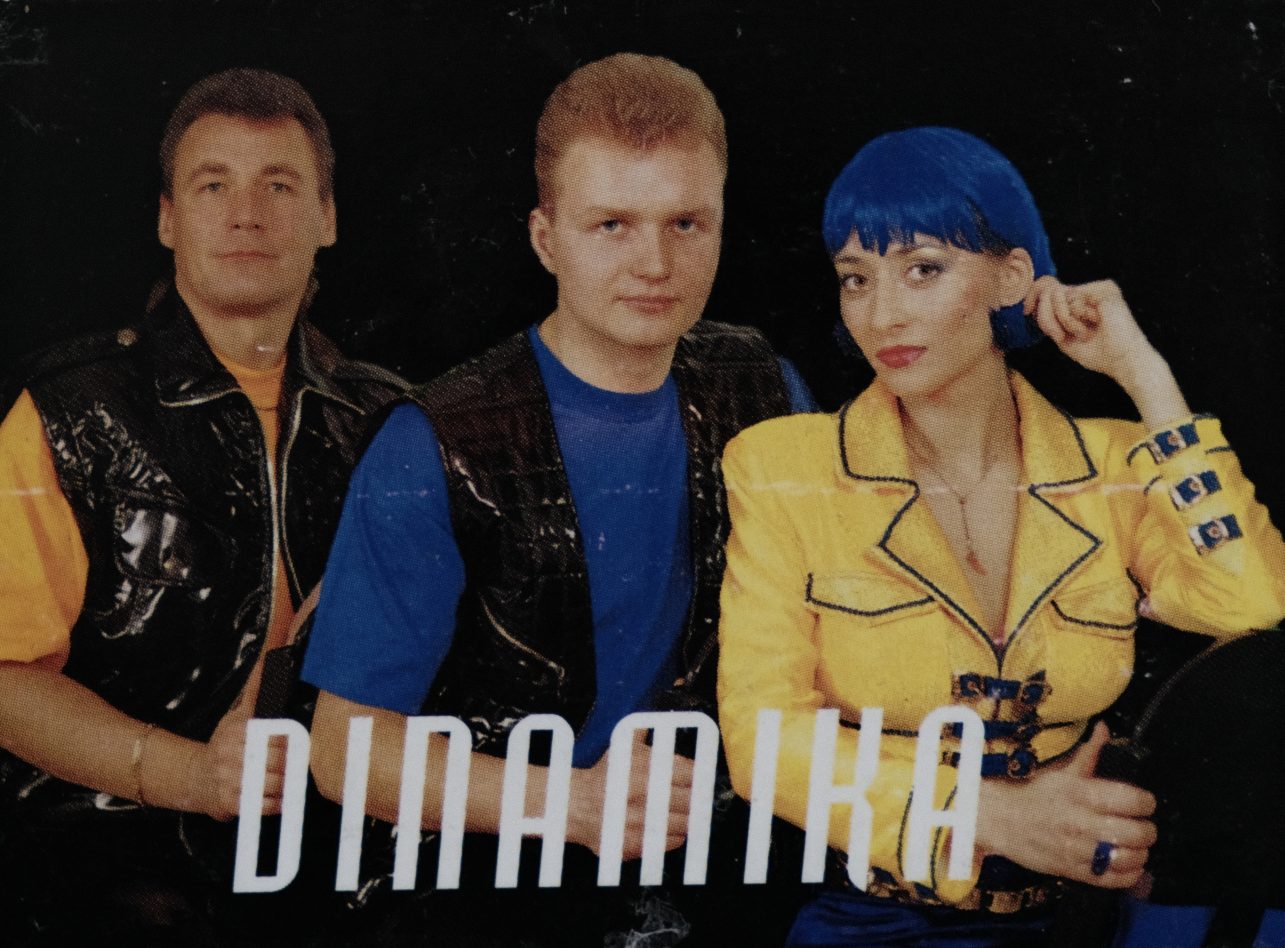“And how am I supposed to live with all this now?” Irma Jurgelevičiūtė tells me on the phone two days after Dinamika’s 30th anniversary concert at the Žalgiris Arena. This sentence, just like the cult-like lyrics of Dinamika’s songs known by heart by several generations, contains all the essence: the lightness and playfulness of being, challenges, and responsibility. The band that blew up all sound systems across Lithuania in the 90s, is filling arenas that did not exist in those days.

We met Irma and Gintautas Brokas in our “native” (I use quotation marks because none of us were born here) Šilainiai, to be more precise, across the highway in Mega. The former 49th high school that Irma attended and Gintas taught at can be found nearby. Anyway, you can find Dinamika’s detailed history online, so let’s talk about – quoting one of their most popular songs – desires, dreams, happiness, and a bit of sadness, for those good things to be sweeter.
Irma believes that the success of the band’s comeback was due to longing by both fans and for each other. “I cried after I got back home from the concert at 4 a.m. I sat down and looked at all those flowers and cried. I realized that all joys, achievements, and fame, like all troubles, are temporary. The most important thing is to find a balance between these things,” the woman explains and adds that currently, she is the best version of herself. And that took time; time spent apart, trying, and making mistakes, searching and coming back.
“I come to the stage, and I know and feel that it is my home. Of course, I get anxious when I begin the first song, so I keep repeating to myself: just breathe, breathe,” Irma recalls the night at the biggest arena in Lithuania on March 16. She is glad, however, that after getting the anxiety under control she is overcome with joy, which, mixed with adrenaline, means endless freedom and a flow of energy. Gintas is proud that they managed to successfully renew the repertoire that thousands know by heart and that technically, the concert was executed perfectly. Even his son praised him for it. Although, of course, both agree that there are no limits to perfection. And who was the first to realize that it was time to meet?
“We have been talking about it for some time,” Gintas, who is ten years older than his former student, admits. However, there were more vocalists. Why did Irma become the one who will always be most associated with Dinamika? “The nation chose her,” the musician smiles. They are both grateful to Martynas Tyla, who provided the space for the duo at the M.A.M.A. awards two years ago, but Irma predicted a comeback long before that. “I felt like the time would come when I called on Gintas and we would return to where we both feel great.”

“Irma and I went our separate ways but didn’t remain enemies. We were not fighting. We were friends, we communicated, and although we did not have some common business, we were always interested in how the other’s life was going. So, we both harbored the idea that sooner or later we would join forces again,” Gintas turns back time several decades back, admitting, that he was waiting for his favorite singer to “go crazy and then put herself back together.”
When I mention Dinamika’s immortal lyrics, Gintas is again succinct. He admits that he has the gift of writing simply and evocatively. “Physics and poetry go together,” he laughs, recalling his short career as a teacher. He wrote his first song in his 30s – let this fact be an inspiration to those who think they have difficulty finding themselves. And why does Irma still enjoy singing songs written three decades ago? Let’s clarify the question first.
“Are Ginta’s songs the best for me to sing? I would say I simply love singing them. It feels good. For example, when I sang “Liepų medu” (Linden Honey) on Saturday, I suddenly felt as if my heart was splitting in two. I wish for everyone who gets on the stage to actually feel what they are singing about. The text is very important. Of course, Dinamika also has some very naive songs. But maybe that is what makes it beautiful – the fact that Dinamika is so childish, even hippie-like, wading through the meadows, unspoiled by time, producers, organizers, and stylists. Dinamika is a gem. I think we met in the 49th high school for a reason. And the subsequent suffering and joys were brought to me by fate so that I would mature, find myself, and prepare my heart for these concerts. Who knows what will come next?”

Irma and Gintas argue a lot – but jokingly – correct each other, notice things, remind things, and finally praise each other. If one accelerates, the other slows down, and if one turns pensive, the other cracks a joke to maintain the pace. The two just go together well and it is obvious that they are stronger together than individually. It’s fascinating that they don’t seem star-struck or chasing the former glory. Which, as befits the 90s, was really grand, unfathomable to modern performers. Even before we met in Mega, Irma gave me four fan club albums that contained detailed collages from articles and photographs. Music and lifestyle reporters chronicled the band’s every move, not just Irma’s fashion adventures, a blue wig, and other bold decisions that female fans were left to copy, but also real or fake love affairs.
Of course, the articles of that time contain many confessions as well. “Irma admits that she is very sensitive and loves to be the center of attention – this is the nature of a Leo,” reads the text published in 1997, on the occasion of the group’s 5th birthday. Gintas is also quoted here saying, “It is important to touch a person’s soul, that string that may have turned callous and rusty… It is not enough to listen with your ears, see it with your eyes, and dance with your feet, you need to feel something on the inside, too.” It seems to me that journalists and their interviewees were more open a few decades ago! When flipping through the albums, a question emerges: where are all those costumes, shoes, and dresses? It turns out that Irma has been diligently safeguarding it all. The fact that her image was always important to her is visible from the interview found in one of the binders with Živilė, the band’s former manager. She describes how she watched Irma looking out the window, and when she asked her where her mind went, Irma answered, “I am thinking about a sleeve.” I would gladly visit Dinamika’s room or a hall in the future Lithuanian pop music hall of fame. Maybe we should establish one for the 50th anniversary of this phenomenon?
30 years is also a considerable period, but many witnesses of that time remember their idols well. “I have not noticed anything, and I am very happy about that,” Gintas replies when asked about the increased attention on the street, which is probably hard to avoid after the campaign advertising the tour of Lithuanian arenas has started. He recalls that 30 years ago there was much more of that attention. Back then the artists felt like they were under a magnifying glass. “I don’t make a big deal out of it, although, of course, a pleasant attention is always nice,” Irma adds.
Dinamika’s 30th-anniversary concerts are attended by many young people who grew up hearing their parents listen to this band. This shows us how universal Gintautas Brokas’ work is. Although newly arranged, the band’s music is on par with modern compositions, and the simple lyrics, responding to the rhythm of a young heart, have also stood the test of time. This type of generational test is a great recognition for a band with a fragmented history.
“Yes, you’re right,” the band members respond succinctly to my observation. Irma talks about a video in which her songs are performed by a girl of Lithuanian origin growing up in Mexico. “This is beautiful. If music reigned on earth, the whole world would be able to understand each other through it. This is not the case now since people want to write the history of the world at any cost, often painful and too high. If we communicated through music, we could live in peace,” Irma is convinced. Both members notice that Dinamika’s music attracts positive people. But perhaps it makes them that way? “Our listener is not someone who would fight or lay on the ground drunk during a concert.” They don’t want to talk about haters much, who are, of course, on the internet. We agree that there will always be sad and attention-seeking people. However, Irma would like to wish joy – sincere, childlike, healing – to everyone.
As a representative of a magazine published in Kaunas, I can’t help but wonder how the band would like to be immortalized in their hometown. We continue to laugh. They say that Dinamika would be happy to give its name to the new arena if someone were to build a bigger one than Žalgiris. The stadium already has a name, but the band would really like to perform there, but probably not this year. So, this could be Kaunas’ thanks to one of its symbols: an invitation to fill a stadium. “Or Taylor Swift, Adele, and other world-class artists could perform here, and I would gladly attend such a concert in my native city,” Irma smiles.
I am beginning to think that these people themselves are gifts to Kaunas, more precisely, to Šilainiai. I know few such patriotic people who, having had all the conditions to settle, if not abroad, then in the capital, remained loyal to this never-completed district full of blocks of flats. “The highway to the seaside is closer from here, Vilnius too; Šilainiai is very green, it is on the hill,” the vocalist lists all the advantages, as usual talking a bit more than her former teacher. But he did mention putting it all into the lyrics of their songs.
Songs to which people fall in love, kiss, start families, cry, meet, break up, maybe are even born or leave this world.

“Irma, when I die, will you sing “Ačiū tau” (Thank You) at my coffin?” Gintas suddenly takes the conversation wheel, reminding us that he is the eldest here. We all laugh, and Irma starts to tear up: “I wonder what that would look like.”
When the conversation turns to future plans, the people of Šilainiai don’t even try to look serious. One thing is clear – Dinamika wants to be on stage and feels the best there. They feel needed. Therefore, concerts are planned in London, Dublin, Oslo, and the United States of America – after all, emigrant Lithuanians took their beloved music with them. And what’s next? The answer is hidden in Irma and Gintas’ Mona Lisa-like smiles.

